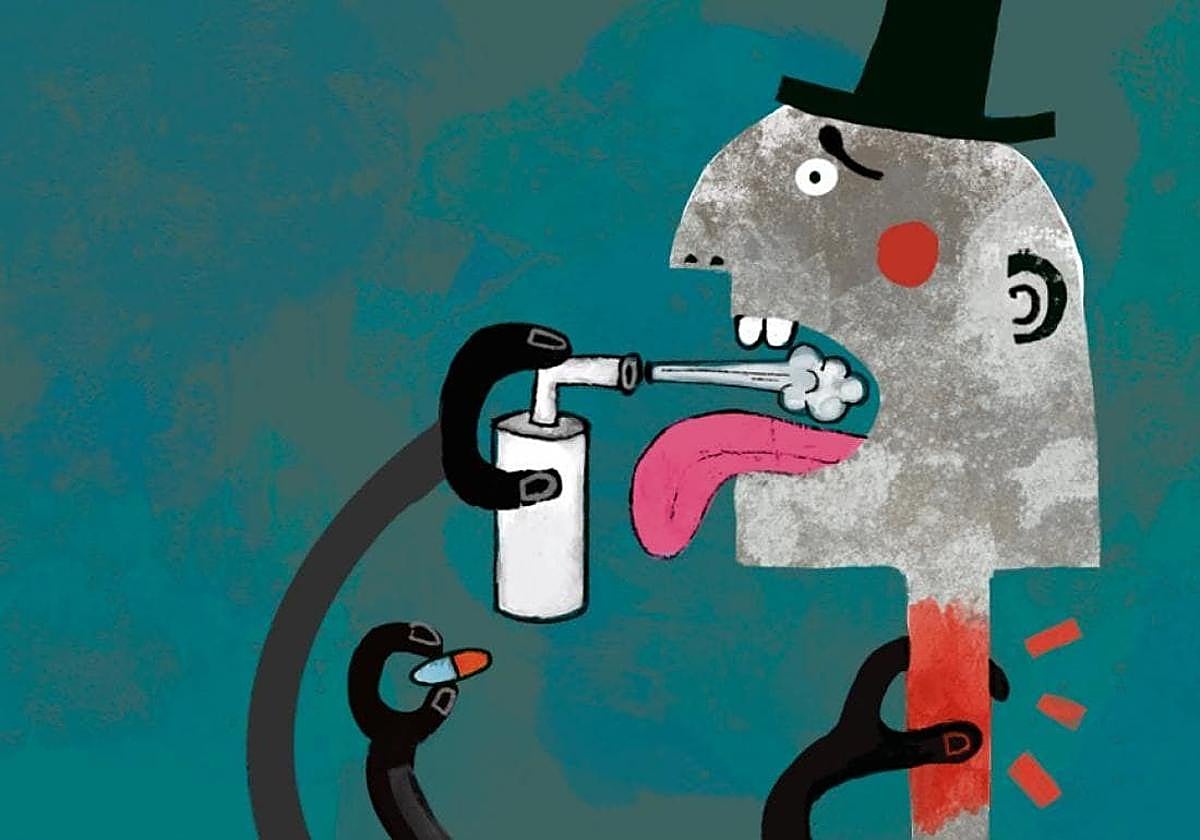Suffering with a sore throat? This is when you should, and should not, take antibiotics
Antibiotics should only be taken when the source of the pain is a bacterial infection, but in most cases it is viral - so what then?
Yolanda Veiga
Madrid
Tuesday, 25 June 2024, 11:53
Sore throat? There is a ‘season' to throat problems, but they can strike at any time of the year. While peak season is late autumn into winter, typically up to February, it helps for now to keep in mind how best to treat this classic winter discomfort. Most sore throats are generally caused by viruses and, to a lesser extent, by bacteria. Knowing if the source is one or the other is essential to applying the best treatment.
The hard truth is that we will have taken antibiotics many times for our throats when there was absolutely no need for them. "The majority of sore throats, around 80%, are of viral origin and are cured without the need to prescribe antibiotics, which are necessary only when it’s a bacterial infection," explains Manuel Mozota, head of the ENT (ear, nose and throat) working group for the Spanish Society of General and Family Doctors (SEMG). At first glance, no doctor can know what the origin of the infection is as both usually present with similar symptoms such as fever, spots and blisters of different colours, pain when swallowing. "The strep test is a test that collects a sample from the throat and in about fifteen minutes tells us whether or not it is due to bacteria."
Coughing, another classic symptom in winter but present year-round
-
Acute cough: “It starts suddenly. It lasts two to three weeks and then goes away. It is usually due to some type of respiratory tract infection: cold, bronchitis, pharyngitis. It can also be due to allergic reactions or asthma," as explained by DosFarma, the market-leading online pharmacy in Spain.
Chronic cough:“It is the kind that lasts more than eight weeks. Smokers are prone to suffer from such a cough, as are patients with lung cancer or gastroesophageal reflux disease (GERD, aka acid reflux).”Dry or unproductive cough:“There is no mucus, it itches and irritates the pharynx, which again generates the urge to cough. It's most annoying at night.“Dry but productive cough:“It is accompanied by the expulsion of phlegm, sputum or other fluids. It is the body's defence mechanism to eliminate those secretions that are obstructing the airways. We notice a noise or some discomfort in the chest due to the accumulated mucus that is trying to be expelled. It is common for it to be at its worst in the mornings."Propolis can prevent but not cure:Propolis, applied directly to the throat or diluted in water, is one of the must-haves for the medicine cabinet in the home. Dr Mozota endorses it as a preventive remedy. ”When there is a virus or bacteria, they affect the defences. A kind of war is declared between the external agent and our body. If we are caught with our defences down, we will respond worse to that attack. However, our defences are high, the body will be more effective in eradicating the infection, avoiding subsequent infections, and there will be fewer symptoms." Propolis, confirms the doctor, along with a vitamin A supplement, "improves our defences and is a good prevention, but it is no miracle cure."
Symptoms
If viral...
It hurts when swallowing (the intensity can vary), spots or blisters may appear on the throat area and you might develop a fever, "which is the body’s natural defences to fight the virus," explains Dr Mozota. "It shouldn't last more than two or three days, and the pain will go away in about five."
If bacterial...
"In this case, in addition to discomfort when swallowing, there are usually more spots than when it is viral and the fever is also higher, reaching 39 or 40 degrees."
Treatments
If viral...
“Analgesics such as ibuprofen and paracetamol relieve the pain. And it also provides some relief to drink milk with honey or lemon (but never apply lemon directly to the throat though, because it is acidic and can irritate), chamomile infusions and placing a small scarf around the neck to keep that area warm. Such measures will alleviate, "but do not eradicate the virus." Neither will antibiotics, which have no effect whatsoever in this case. "The virus will go as quietly as it arrived," says Dr Mozota.
If bacterial...
“It is necessary to take antibiotics for seven to ten days. In fact, if we don't take them we can suffer some serious complications, such as blood infections, bronchitis and even pneumonia. If the sore throat is accompanied by mucus, then the phlegm heads down to the lungs and there may be respiratory issues," explains Dr Mozota. Once treatment has started, "in 48 hours we should notice a clear improvement and a significant drop in fever," although we must complete the treatment even if starting to feel better. "Many people say that taking antibiotics leaves them knocked for six, but it is not the medication, rather the fever, that causes this state of affairs."
Is it contagious?
"Yes, it is contagious regardless of whether it is caused by a virus or bacteria," warns the expert, who attributes the decrease in sore throat cases in recent winters to people continuing to use a mask when unwell. "The most dangerous days are the early ones because there is a greater viral or bacterial load and, therefore, more possibilities of contagion." In fact, as the ENT specialist explains, in the case of a sore throat caused by bacteria, two days after taking the antibiotic "there is hardly any chance of contagion." And, as with coronavirus and other viruses, the doctor adds a note of caution: "a person can be a carrier without having symptoms and can infect another person.”



